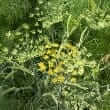Background
- Fennel is native to the Mediterranean region. For centuries, fennel fruits have been used as traditional herbal medicine in Europe and China. For the treatment of infants suffering from dyspeptic (indigestion) disorders, fennel tea is the remedy of first choice. Its administration as a carminative (digestive aid) is practiced in infant care in private homes and in maternity clinics where it is highly appreciated for its mild flavor and good tolerance.
- There is evidence suggesting that fennel is effective in reducing infantile colic. Fennel has also been studied in human clinical trials for ACE inhibitor-induced cough, dysmenorrhea (painful menstruation), and ultraviolet protection, but additional research is merited in these areas.
References
Natural Standard developed the above evidence-based information based on a thorough systematic review of the available scientific articles. For comprehensive information about alternative and complementary therapies on the professional level, go to . Selected references are listed below.
- Alexandrovich I, Rakovitskaya O, Kolmo E, et al. The effect of fennel (Foeniculum Vulgare) seed oil emulsion in infantile colic: a randomized, placebo-controlled study. Altern Ther Health Med 2003;9(4):58-61.
View Abstract - Asero R. Fennel, cucumber, and melon allergy successfully treated with pollen-specific injection immunotherapy. Ann Allergy Asthma Immunol 2000;84(4):460-462.
View Abstract - Berdonces JL. [Attention deficit and infantile hyperactivity]. Rev Enferm 2001;24(1):11-14.
View Abstract - Chainy GB, Manna SK, Chaturvedi MM, et al. Anethole blocks both early and late cellular responses transduced by tumor necrosis factor: effect on NF-kappaB, AP-1, JNK, MAPKK and apoptosis. Oncogene 2000;19(25):2943-2950.
View Abstract - De Vincenzi M, Silano M, Maialetti F, et al. Constituents of aromatic plants: II. Estragole. Fitoterapia 2000;71(6):725-729.
View Abstract - Haze S, Sakai K, Gozu Y. Effects of fragrance inhalation on sympathetic activity in normal adults. Jpn J Pharmacol 2002;90(3):247-253.
View Abstract - Iten F, Saller R. [Fennel tea: risk assessment of the phytogenic monosubstance estragole in comparison to the natural multicomponent mixture]. Forsch Komplementarmed Klass Naturheilkd 2004;11(2):104-108.
View Abstract - Iyer LV, Ho MN, Shinn WM, et al. Glucuronidation of 1'-hydroxyestragole (1'-HE) by human UDP-glucuronosyltransferases UGT2B7 and UGT1A9. Toxicol Sci 2003;73(1):36-43.
View Abstract - Muhlbauer RC, Lozano A, Reinli A, et al. Various selected vegetables, fruits, mushrooms and red wine residue inhibit bone resorption in rats. J Nutr 2003;133(11):3592-3597.
View Abstract - Namavar JB, Tartifizadeh A, Khabnadideh S. Comparison of fennel and mefenamic acid for the treatment of primary dysmenorrhea. Int J Gynaecol Obstet 2003;80(2):153-157.
View Abstract - Ng SS, Figg WD. Antitumor activity of herbal supplements in human prostate cancer xenografts implanted in immunodeficient mice. Anticancer Res 2003;23(5A):3585-3590.
View Abstract - Saleh M, Hashem F, Grace M. Volatile oil of Egyptian sween fennel (Foeniculum vulgare, var. dulce. Alef.) and its effects on isolated smooth muscles. Pharm Pharmacol Lett 2005;6(1):5-7.
- Satyanarayana S, Sushruta K, Sarma GS, et al. Antioxidant activity of the aqueous extracts of spicy food additives--evaluation and comparison with ascorbic acid in in-vitro systems. J Herb Pharmacother 2004;4(2):1-10.
View Abstract - Vasudevan K, Vembar S, Veeraraghavan K, et al. Influence of intragastric perfusion of aqueous spice extracts on acid secretion in anesthetized albino rats. Indian J Gastroenterol 2000;19(2):53-56.
View Abstract - Zhu M, Wong PY, Li RC. Effect of oral administration of fennel (Foeniculum vulgare) on ciprofloxacin absorption and disposition in the rat. J Pharm Pharmacol 1999;51(12):1391-1396.
View Abstract







